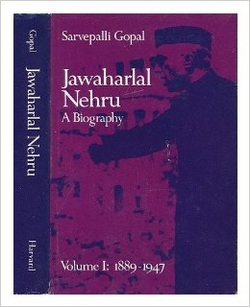
In the final years of the British raj, Jawaharlal Nehru emerged as India's preeminent statesman and as a model of pragmatic leadership. The journey to that position led Nehru though the lecture halls of Harrow and Cambridge, but also a discipleship under Mahatma Gandhi, and nearly ten years imprisonment in British gaols. He emerged, in the end, as India's first prime minister and one of the longest tenured statesmen of the last century.
The first volume of Sarvepalli Gopal's three volume biography emphasizes Nehru's steadfast development from a romantic nationalist into a courageous pragmatist. In the process, Nehru navigated four tense decades as a leading member of the Indian National Congress, the nationalist organization which used the tools of non-violence and non-cooperation to pry India away from an exhausted British empire.
The independence of India was not an historical inevitability. Nationalist aspirations lacked shape and spirit prior to Mahatma Gandhi's entrance on the scene in 1915. In the shadow of Gandhi's lean, ascetic frame and his unyielding emphasis on social reform, Nehru and Congress overcame their association with British privilege and gave Indian nationalism a distinct, powerful, and popular voice. Their campaigns of non-cooperation and non-violence ebbed and flowed the like a tide throughout the interwar years. They rallied the uneducated masses, and rattled the nerves of the British raj.
After years of struggle, the world-wide political conflicts surrounding the Second World War served as a catalyst to the fall of the British raj. The war opened the final chapter in Nehru's struggle for independence. The United Kingdom relied upon India as the second pillar of its military efforts; Britain brought India--a fifth of the world's population--into the war unasked. The war also depleted the resources of the Indian civil service, and required the British to hand increasing portions of power to domestic Indian interests and domestic Indian bureaucrats. Winston Churchill, Britain's war-time leader, nevertheless attempted to hold on to India with the mass arrest of Congress leaders and offers of post-dated settlements for independence. But the war strained the British to the breaking point and made a rapid compromise towards independence the only honorable political recourse.
Nehru's Congress led the negotiations. Against Gandhi's wishes, Nehru accepted Muhammad Ali Jinnah's demands for a separate Pakistan. In the face of rising communal violence, Nehru firmly held the reins of Congress, and prevented the emergence of a strong ethnic Hindu party. Nehru merged social reform into Indian independence, and thus paved the way for a more liberal, democratic India even as Congress rejected further British intervention. He channeled the forces of nationalism, revivalism, and modernization as he and his allies established one of the largest countries on Earth. Gopal's first volume concludes at the dawn of an independent India on 14 August 1947; Nehru served India as prime minister until 1964. His premiership eventually wrestled with the creation of Pakistan, violent tensions with communist China, and all the challenges of the Cold War.
Gopal's biography expertly evokes the political environment surrounding Nehru's development, but the author also soberly demonstrates how personal attachment moderated Jawaharlal Nehru's political life. With touching devotion, Nehru's father and mother abandoned bourgeois comforts to follow their son into the dangerous politics of swaraj. Motilal Nehru, Jawaharlal's father, emerges as a moderate and patient hero in the first half of the book; he openly acknowledges his relentless pride in his son's efforts, yet helps to curb Jawaharlal's radical, youthful tendencies. With the backing of his parents, Jawaharlal devoted himself to the cause of an independent India, and began disciplining his political ideas with a cautious ear towards Gandhi's sympathy for the Indian poor. Gopal also rises to the occasion when depicting the troubled but deeply felt marriage between Jawaharlal and Kamala Nehru. Nehru's personal relationships with his father, mother, wife and mentors conditioned his political involvement with touches of humanity and sudden bursts of patient compromise.
Gopal is somewhat less successful in explaining Nehru's early rise to power in the United Provinces. Nehru's appeal as a well-travelled, well-educated, mid-career nationalist emerges clearly, but why did Gandhi and Annie Besant devote so much attention to the young man as early as 1914? These connections remain somewhat mysterious in Gopal's present volume. Ostensibly, Motilal's connections as a powerful and wealthy lawyer played a decisive role helping his son meet these individuals, but the nature of the connections stands uncertain to a reader (such as myself) less familiar with the early years of the Indian nationalist movement.
Despite that one difficulty, Gopal presents the story of Nehru's development with candor and confidence.
Many statesmen marshaled nationalist sentiment in the twentieth century: Churchill, Hitler, and Roosevelt; Stalin, Mussolini and Mao. Among them all, Gopal's Nehru emerges as the most effectively peaceful and virtuous in his rise to power, and the most magnanimous in his use of authority.
 RSS Feed
RSS Feed